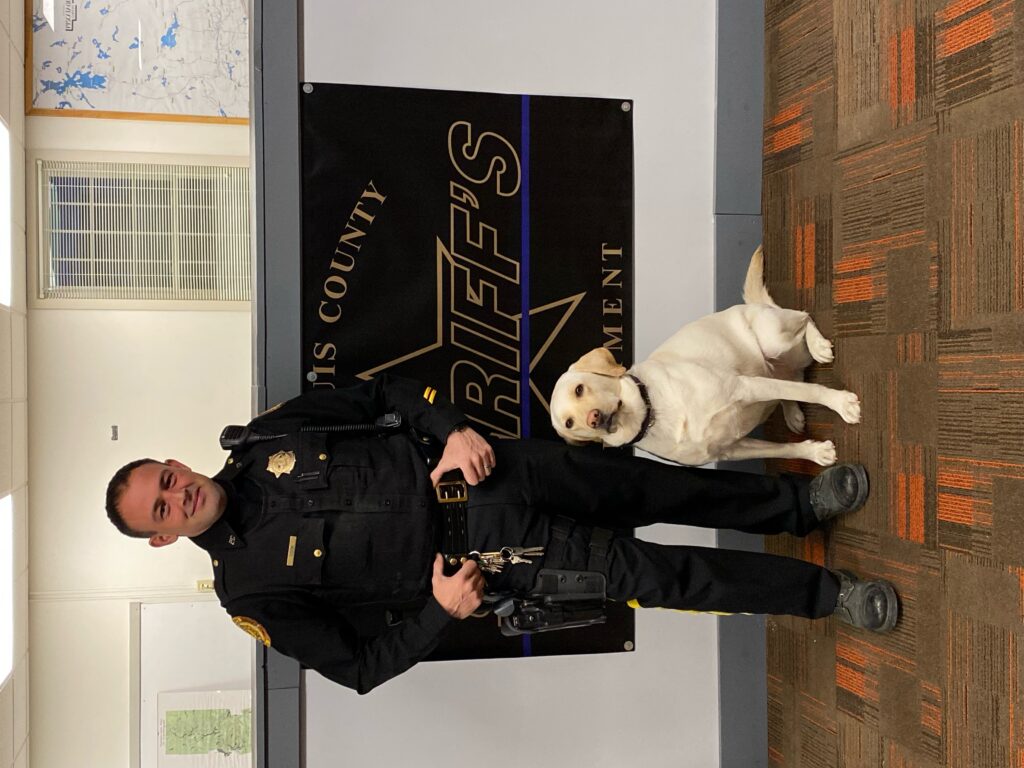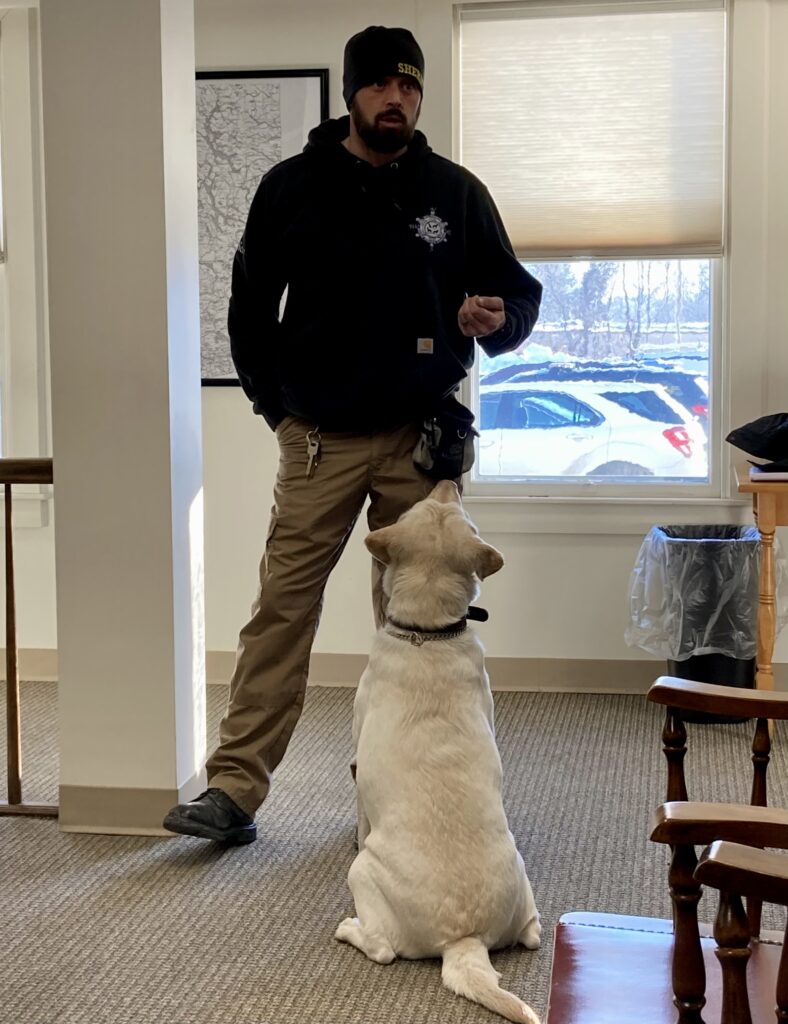
Piscataquis sheriff’s office hopes new dog will help police fight drug trafficking
DOVER-FOXCROFT — The newest member of Piscataquis County Sheriff’s Office is bubbly, loyal and sweet — and she has the most powerful nose in the department.
The 2-year-old Labrador, named Sccy (pronounced skIE and spelled like the pistol manufacturer), recently completed 320 hours of training and became certified to detect narcotics through the Maine Criminal Justice Academy.
They’ll continue to train so she can earn certification in scent tracking to locate missing people, which means 120 additional hours, and article searching to retrieve items with human scent for evidence, 80 additional hours, according to her handler, Investigator Robert Cook.

After several years without a trained dog, the sheriff’s office decided to revive the effort because it is another tool to combat drug trafficking in Piscataquis County, Cook said. Drug offenses and overdoses have remained steady throughout the county in the last several years, though there is a distinct increase compared to previous years. The dog will be used in settings such as traffic stops, residence searches and the jail in Dover-Foxcroft to detect cocaine, cocaine base, ecstasy, heroin and methamphetamine.
“We were tired of hearing that there are so many drugs in the county, and we didn’t have any means of identifying with a dog,” said Cook, who has been with the sheriff’s office since 2018. “It is well-known that there is a drug issue nationwide. We deal with a lot of overdoses. We’re just trying to curb that issue and fight the war on drugs.”
Reintroducing a trained dog and assigning a lieutenant to the Maine Drug Enforcement Agency to handle drug investigations are a couple of the measures the sheriff’s office has taken to address drug trafficking.
The sheriff’s office saw 86 drug offenses, including overdoses, in 2021, but the data doesn’t provide a comprehensive picture of the sheriff’s office’s encounters with drugs because it only shows incidents where illegal drug use is the primary issue, Sheriff Robert Young said. The department most often comes across heroin and methamphetamine, he said.
“There are many calls, from domestic violence to bail violations, where illegal drug use is a secondary factor,” he said. “By that, I mean instances such as a call for a person slumped over the wheel of a car and it is an overdose, or officers conducting a bail search and finding drugs, or [they] respond to a person out of control and drugs are present.”
Maintaining a trained dog requires a huge commitment, Young said during a Piscataquis County Commissioners meeting in early February. The sheriff’s office had a program with three dogs several years ago, but they eventually retired.

MEET HIS PARTNER – Investigator Robert Cook introduces his new canine partner, Sccy, during a Piscataquis County Commissioners meeting Feb. 1 at the Peaks House in Dover-Foxcroft.
The right combination of officer and dog and constant training is key for the program to work well, he said.
Cook received a German shepherd, donated to him from Connecticut, when the sheriff’s office first began exploring getting a trained dog.The dog was not a good fit for law enforcement work and was given to a man who previously had working dogs on his farm, Cook said.
Then Sccy came along from an elderly woman in Washington County who was overfeeding the energetic dog to keep her calm, Cook said.
“She was a little too much for the woman,” he said. “ When I got her, she looked like a sausage. It took a lot of work to thin her out.”
Although it took some time, Sccy understands that she has a real purpose, he said. She hates being away from her handler or left in the vehicle. She loves people and other dogs. Balls and toys are fine, but kibble is Sccy’s main motivation and gets her to work hard.
If the dog is ever exposed to drugs that put her in danger, it would mean a speedy drive to the veterinarian, Cook said. He also carries a first-aid kit with naloxone, an opioid overdose reversal drug, if she is exposed to something such as heroin or fentanyl.
The pair works closely with All Points Maine Police Canines in Franklin County and Down East Canines in Washington County, where the trainers provide a variety of exercises to properly train and build trust between the dog and handler.
All Points Maine Police Canines is working with 14 teams, including those in Aroostook, Knox, Oxford and Somerset counties, said Lt. David Rackliffe, who works for the Franklin County Sheriff’s Office in Farmington.
The handlers and dogs train in varied settings, such as inside vacant warehouses and used cars that are headed to the scrapyard, Rackliffe said. Some area car dealerships opened their doors to the trainers when certain spaces were shut down during the pandemic.
“The dog is a detection tool,” he said. “We use them because they have the capacity to smell things that we just can’t smell. That’s where it’s super on the handler to learn to read and trust their dog. When the dog says something is there, you have to trust that it’s there, even if you can’t see it.”
Cook hopes that once drug traffickers realize a narcotics-detection dog has joined the team, it might help deter them from Piscataquis County.
“He [Cook] has really put in a lot of work not just on training days,” Rackliffe said. “He has poured himself into this dog to make her successful and to give Piscataquis a program that is successful.”